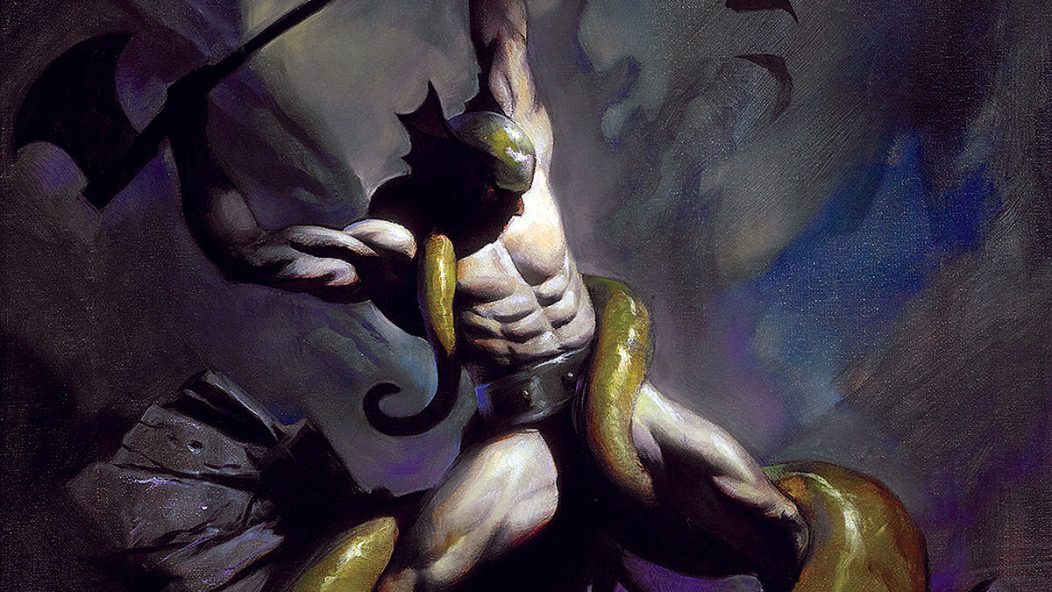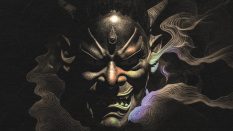
Ironflame's Bold Traditional Metal Ventures "Where Madness Dares" (Interview)
Rare is the band that can, like clockwork, drop a killer catchy heavy metal album every year or two without any dropoff in quality; there’s a reason that fans dread a “sophomore slump” after killer debut albums, and most bands just can’t keep up any level of quality over time. Ironflame has proved to be a strong exception to that and each one of their albums has been absolutely awesome, the new one included.
They first caught my attention with their powerful debut Lightning Strikes the Crown, which came out of nowhere with no demos or EPs to announce the band’s existence; when I interviewed band main man Andrew D’Cagna about the solo album, he admitted that he’d put together the entire thing in just a couple of days, taking advantage of decades of songwriting experience to come up with what now strikes me as his clearest talent: writing dope heavy metal. A few years later we have a new album Where Madness Dwells that is perhaps riffier than any of their previous material but continues in the same strong vein of catchy, melodic power metal (a la old Queensrÿche or Twisted Tower Dire rather than the less guitar-driven European power metal style) and Ironflame is still showing absolutely no signs of slowing down.
The core of Ironflame’s sound, as before, is D’Cagna’s powerful and attention-grabbing singing. His strong tenor has a very characteristic and catchy tendency to alternate quickly between more fully-voiced verse lines and more open wails that sound very distinctly Andrew, and every song on Where Madness Dwells has massive choruses that quickly turn the entire album into a singalong in the same way that the best classics tend to. Despite that very vocal-centric approach, there’s not a shortage of killer guitar work. Pretty much any time Andrew isn’t singing, there’s a great melody playing or a killer solo helping to force each song to be as memorable as possible; everything that can be turned into a hook is, and any songwriting tool that can lend power to a new verse is used. The end result is a tight 40 minutes (on vinyl–the CD has a couple bonus tracks, pushing the length up) of old school power metal in a style that’s oft-attempted but not often done well. It makes sense that Ironflame has been picked up by German juggernauts High Roller Records because they’ve become a veritable machine of great tunes and, if the Live at Keep It True DVD is any indication, of great live performances.
After appearances around festivals in the United States and Europe and all of these strong albums, it seemed like it was time to sit down again with Andrew. Read below for an interview with him about Where Madness Dwells and check out the album on his Bandcamp.
…
…
When we first talked some years ago, you told me that the riffs and structures for the songs from Lightning Strikes the Crown were written in just two days of frantic songwriting. Four albums in, are you still putting together new material that quickly? Has anything changed?
Well, yes and no. I did write and record the first two albums that way, albeit not necessarily intentional. The first album just kind of fell out of me. Very little time and absolutely no forethought involved. Straight from the heart and as a result, a very effortless process. I don’t actually remember recording most of it. The second album was almost an identical scenario. The difference with Tales of Splendor and Sorrow was that it was originally meant to be an EP with every song thematically based on Greco-Roman mythology. I wrote the music for five songs and really started losing steam lyrically by the fourth song. So, I wrapped up the fifth song by writing about a fictional battle for control of the island of Crete and began working on the layout. Jim Dofka, who performed the guitar solos on Tales of Splendor and Sorrow, convinced me to write a few more songs and release it as a full-length album. So that’s what I did. In hindsight I don’t regret it. A few staple songs in our catalog came out of it, like “The Contract.” But I couldn’t help but wonder, am I on the right path here? Am I selling myself short by writing so hastily? What if I don’t just commit to the first idea that comes to my mind? Could it be better? I had to know. So, I went a completely different route when composing Blood Red Victory. I wrote at least two dozen songs musically, then whittled them down to ten. Again, this was a decision I do not regret looking back. It was a worthwhile experiment and though I love every song on that album, I’m not sure if it was “better.” The most recent album was a return to form as far as being composed and recorded quickly, though not intentionally.
Did you learn anything that you were able to carry forward from the experience of taking more time with Blood Red Victory?
I’m honestly not sure if I learned anything from the experience, though I do feel it was the right choice at the time. I think I already knew that there isn’t a “right” way to go about making music. It’s really all about whatever you as an artist is feeling at the time and following through with it. Every recording I have ever done has taught me things that I carry with me from then onward. Part of it is driven by pure curiosity and part of it is driven by things I’ve done in previous recordings that I feel could have been better in hindsight. One of the downsides of being an artist is looking back on your previous work with some level of dissatisfaction; a hunger to improve yourself.
Ironflame went very quickly from a new and unproven band to playing festivals in Europe, and is now signed to German-based label High Roller Records. When did you realize that Ironflame is a hit?
As many people know, Ironflame began as a one-off solo project, a tribute to a fallen friend. For years, I did projects like this all the time with various sub-genres of the Metal realm. I would get an itch to write something, so I would. I would make a few copies to sell and I would move on. Self-satisfaction was my only motivation. I normally don’t promote these projects very hard, but I was dead-set on releasing Ironflame on vinyl. Making vinyl is pricey, so I felt inclined to promote the album to ensure I would sell enough copies to not lose my ass financially. All I really did was post a few songs preemptively as YouTube videos. Apparently, there are some people who constantly hunt YouTube for new music because word traveled quickly. A few YouTube channels shared the songs and it really snowballed from there. I guess it was around that time I realized I was writing music that appealed to more people than just myself.
You started releasing music in the ’90s when the internet was less ubiquitous than now. Did you realize at any point in between Angelrust or Moonthrone and now that it was such a strong avenue for promotion? Was Ironflame the first hit you’ve had that was so driven by online communities?
I realized the potential of the internet pretty much immediately. I live in a fairly rural area where it takes years for worldwide trends to reach here. It’s always been difficult to find like-minded people who were even aware of the underground Metal scene, let alone appreciate the music. Once the internet reached our area I was immediately able to join online communities and share music with people from all over the world. I’ve been using the web as a personal marketing tool ever since.
Over time to me it’s sounded like the songwriting on new Ironflame records has gotten a little bit more “progressive” and tighter; has that been a natural evolution?
I suppose when you create music under the same banner for so long that evolution is inevitable. Until the most recent album, Ironflame song structures were what I would call predictable. I had a system that seemed to work and I clung tenaciously to it. But as we all know; predictability leads to boredom. I was beginning to bore myself but more importantly, by this time I felt we owed it to our fans to do better. The songwriting direction I chose with Where Madness Dwells wasn’t a total departure from my roots, but it was rather bold. I purposely strayed from the signature guitar harmonies we were known for being the foundation of every song. I went for a riff-based approach, leaving the guitar harmonies as accessories instead of building the songs around them. I think it’s funny that you used the word progressive because to me, the end result was a much more stripped-down affair. It has a very old school Heavy Metal feel to it and I’m very pleased with the overall atmosphere of the album.
Will you continue to branch out with different songwriting approaches to stave off boredom on future albums? Is there anything you’ve never done that you’d like to try out with Ironflame?
I try to do something different with every album but until now, there hasn’t been a real shift in the songwriting department. Usually I will change up things cosmetically, like using a different amp for the guitars. Some albums have two rhythm guitar tracks (left and right) and some have four (two left and two right). Sometimes I track the bass guitar directly into the computer and sometimes I will mic up a bass amp. The things that never change are the source instruments. I’ve used the same guitar and bass for every Ironflame album, as well as the same vocal mic. I just sold the drum kit I’ve been using in the studio for the past twenty years and upgraded to a great sounding vintage kit from the 70s, so I am excited to hear how they will affect the sound of
future recordings. As far as songwriting goes, I have been wondering recently if I can write an album or even just a song by recording drums first, then composing music around the drum tracks.
Ironflame has had a certain continuity of aesthetic over each album despite having had a variety of artists painting your covers. Is having a unified aesthetic over time important to you? What is your criteria when looking for an artist to work with?
I feel that cover art is extremely important. To me, it’s equally as important as the songs themselves. It’s part of the production, visually speaking. The cover is the first impression of an album from the listener’s perspective and has a huge influence on the overall atmosphere of the music. I take this part of the process very seriously. Every album cover so far has been an actual painting. None of them have been commissioned works, they were all pre-existing works I merely licensed for use. My only requirement is that it complements the album. I normally don’t have a vision of what I want the cover to be until the album is done, mainly because of the way our music is written. I’m not opposed to using digital art but it would have to at least look like a traditional painting. I am a child of the ’80s. My first visual impressions of Heavy Metal were Iron Maiden album covers and that’s a big part of what lured me into the Metal realm in the first place.
…
Where Madness Dwells is out now on High Roller Records.











